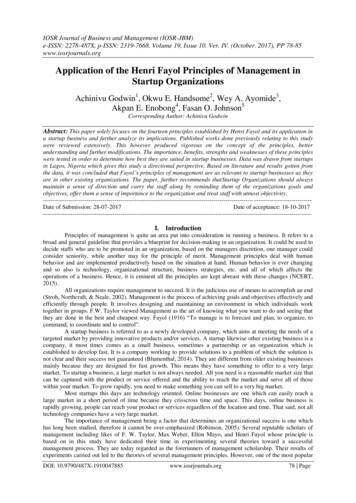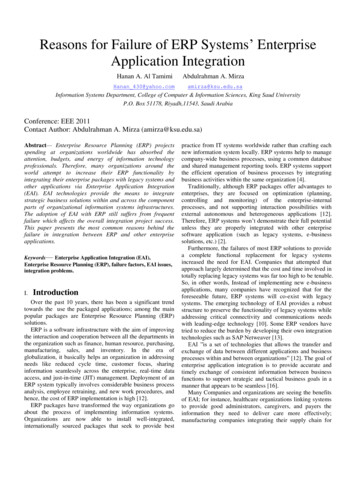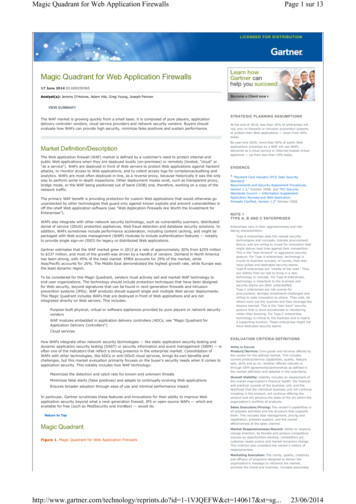
Transcription
IOSR Journal of Business and Management (IOSR-JBM)e-ISSN: 2278-487X, p-ISSN: 2319-7668. Volume 19, Issue 10. Ver. IV. (October. 2017), PP 78-85www.iosrjournals.orgApplication of the Henri Fayol Principles of Management inStartup OrganizationsAchinivu Godwin1, Okwu E. Handsome2, Wey A. Ayomide3,Akpan E. Enobong4, Fasan O. Johnson5Corresponding Author: Achinivu GodwinAbstract: This paper solely focuses on the fourteen principles established by Henri Fayol and its application ina startup business and further analyze its implications. Published works done previously relating to this studywere reviewed extensively. This however produced vigorous on the concept of the principles, betterunderstanding and further modifications. The importance, benefits, strengths and weaknesses of these principleswere tested in order to determine how best they are suited in startup businesses. Data was drawn from startupsin Lagos, Nigeria which gives this study a directional perspective. Based on literature and results gotten fromthe data, it was concluded that Fayol’s principles of management are as relevant to startup businesses as theyare in other existing organizations. The paper, further recommends thatStartup Organizations should alwaysmaintain a sense of direction and carry the staff along by reminding them of the organizations goals andobjectives, offer them a sense of importance to the organization and treat staff with utmost ------------------ ----------------------------Date of Submission: 28-07-2017Date of acceptance: ---------------------------------------------I. IntroductionPrinciples of management is quite an area put into consideration in running a business. It refers to abroad and general guideline that provides a blueprint for decision-making in an organization. It could be used todecide staffs who are to be promoted in an organization, based on the managers discretion, one manager couldconsider seniority, while another may for the principle of merit. Management principles deal with humanbehavior and are implemented productively based on the situation at hand. Human behavior is ever changingand so also is technology, organizational structure, business strategies, etc. and all of which affects theoperations of a business. Hence, it is eminent all the principles are kept abreast with these changes (NCERT,2015).All organizations require management to succeed. It is the judicious use of means to accomplish an end(Stroh, Northcraft, & Neale, 2002). Management is the process of achieving goals and objectives effectively andefficiently through people. It involves designing and maintaining an environment in which individuals worktogether in groups. F.W. Taylor viewed Management as the art of knowing what you want to do and seeing thatthey are done in the best and cheapest way. Fayol (1916) “To manage is to forecast and plan, to organize, tocommand, to coordinate and to control”.A startup business is referred to as a newly developed company, which aims at meeting the needs of atargeted market by providing innovative products and/or services. A startup likewise other existing business is acompany, it most times comes as a small business, sometimes a partnership or an organization which isestablished to develop fast. It is a company working to provide solutions to a problem of which the solution isnot clear and their success not guaranteed (Blumenthal, 2014). They are different from older existing businessesmainly because they are designed for fast growth. This means they have something to offer to a very largemarket. To startup a business, a large market is not always needed. All you need is a reasonable market size thatcan be captured with the product or service offered and the ability to reach the market and serve all of thosewithin your market. To grow rapidly, you need to make something you can sell to a very big market.Most startups this days are technology oriented. Online businesses are one which can easily reach alarge market in a short period of time because they crisscross time and space. This days, online business israpidly growing, people can reach your product or services regardless of the location and time. That said, not alltechnology companies have a very large market.The importance of management being a factor that determines an organizational success is one whichhas long been studied, therefore it cannot be over-emphasized (Robinson, 2005). Several reputable scholars ofmanagement including likes of F. W. Taylor, Max Weber, Elton Mayo, and Henri Fayol whose principle isbased on in this study have dedicated their time in experimenting several theories toward a successfulmanagement process. They are today regarded as the forerunners of management scholarship. Their results ofexperiments carried out led to the theories of several management principles. However, one of the most popularDOI: 10.9790/487X-1910047885www.iosrjournals.org78 Page
Application of the Henri Fayol Principles of Management in Startup Organizationsamong the several management principles postulated is the Henri Fayol‟s „14 principles of management‟(Witzel, 2003) Henri Fayol was nicknamed the father of modern management due to the popularity and wideadoption of his management principles(Witzel, 2003; Wren, Bedeian, & Breeze, 2002). In 1916 Henri Fayolpublished the „14 principles of management‟. Management researchers over the years opine that theseprinciplesadvocated by Fayol is what transformed to the present-day management and administration. It isbelieved that every organization today one way or the other implement the Fayol‟s principles of management.This paper therefore, looks to critically analyze the application of the Fayol‟s 14 principles of managementhighlighting their implications to a startup business.Henri Fayol’s 14 PrinciplesDivision of workThis is the first principle postulated by Henry Fayol. It states that staff perform better at work whenthey are assigned jobs according to their specialization. Hence, division of work to smaller elements turn out tobedominant. Specialization is important as staff perform specific tasks not only at a single time but as a routineduty also (Uzuegbu&Nnadozie, 2015).It is applicable to organizations that have many employees as well as those that have few. The principlestates that work should be divided amongst people that are capable of doing the job and not be overloaded to aconcentrated few. This principle also denotes that, work should not be diluted by giving the same work to toomany people. It helps ensure proper utilization of labor, keeps them focused, and industrious.Fayol, argued that efficiency and effectiveness can be achieved if one staff member is doing one thingat a time and another doing a different thing.In startups, there exist divisions of work.However, as observed invarious startups analyzed, Work is divided into departments ranging from the finance department where allfinancial transactions are carried out and they keep record of the financial statements to be able to predict thefinancial position of the organization, and as the principle predicts, not all people in the department will carryout the same job, someone can be assigned to carry out bank duties, another prepare vouchers, while otherscould be in charge of disbursements. It is the job of the Head of Departments to allocate jobs to employees inthat department based on specialization. Also in the organizations, they have the administration department ofwhich majority classifies as both admin and Human resource. In this department, they have staff that major inemployee welfare, filing of documents allocate jobs as directed by the top management. then there is themarketing & sales department where skilled labor is employed to market and promote sales of the companyproduct. Being that they are startups, most of them depend mostly on the marketing department as thisdepartment determines most customer base they get and how far their product can go into the market. finally, itwas observed that they have the IT departments. In contemporary companies, I.T. (Information Technology)department is considered vital, as they handle most of the operations that deal with the internet, they also savedata and information of the organizations stakeholders, their jobs are considered pivotal and requires skilledpeople to carry out. Fayol however was indeed correct in this principle in the sense that all jobs cannot be donetogether by all staff at the same time, there is need for division of labor to exercise specialization. Thisobservation can however be backed by the suggestion of (Uzuegbu&Nnadozie, 2015) that the amount of jobsexecuted for a day can be more meaningful when divided amongst staff in various departments than when everystaff member is clustered for each of the job elements, one after another. Therefore, permanent duties areassigned to staff and they make daily reports on their performance.The principle of AuthorityThis refers to the right to issue commands, along with which must be a balanced responsibility for itsfunction. This principle suggests that there is a need for managers to have authority in order to commandsubordinates so they can perform their jobs while being responsible for their actions. (Pathak, 2015), sees it asthe power to give orders and get it obeyed or in other words it is the power to take decisions. The principle isboth formal and informal of which is most recommended for managers. The formality being theresponsibilities,this is the expectation of the organization for the manager, whereas the informality being theauthority,refers to the manager‟s autonomy to command,direct, and ensure that he performshis responsibilitiessuccessfully. (Pathak, 2015) also suggest that both Authority and responsibility must go hand in hand. Meaning,proper authority should be delegated to meet the responsibilities. Fayol suggests that, only few people showhave the power and responsibility to give orders. One of the common errors of large companies is thatmanagement encompasses too many people, thereby giving rise to conflict. When few selected people have thepower to vote, the authority is carried down the chain and the process gets implemented. With such authoritycomes responsibility. Fayol believed that since a manager must be responsible for his duties, he should as wellhave authority backing him up to accomplish his duties. This isvitalfor organizational success.As observed in studied startups, the case is similar. Heads of departments are responsible for the affairsof their departments and however have the authority to oversee operations in their departments. In the case ofDOI: 10.9790/487X-1910047885www.iosrjournals.org79 Page
Application of the Henri Fayol Principles of Management in Startup Organizationssubordinates, it was observed that each employee has the prerogative to make decision all dependent on theseverity of the decision. However, certain decisions must be made by the heads of departments and if theclassified information goes beyond the portfolio of the head of the department, then the general manager stepsin. this in turn allows for smooth operations.Its fortunate that most departmental heads in the startups do notbecome so arrogant and vain with their status, level of authority and they also deem it necessary to sometimesinteract and relate with their staff. As a result, it develops a good and productive working environment.Thisargument can be approved by Blackburn and Rosen (1993)that successful organisations apply participatorymanagement and staff empowerment against the authority and responsibility principle. It was observed that withthis style, managers are more of coordinators rather than dictators. Hence, Startup businesses may not need anautocratic type of management but preferably a participatory. Such will bring about ideas, innovation, freedomof expression from junior staff, which research has shown to have positive contributions to the growth andsuccess of an organisations (Blackburn & Rosen, 1993).Principle of DisciplineThis principle promotes clearly-defined rules and regulations intended to achieve good employee discipline and obedience. It is often a part of the core values of an organization in form of good conduct, respectfulinteractions, proper dress code, etc. This principle is essential and seen as the engine oil to make an organizationrun smoothly. It goes without saying that management is responsible for the way discipline is maintained in anorganization. This discipline upon promotion, saturates down the line, to the end of the employee chain aswell.Fayol observed the natural human tendencies to lawlessness and perceived the level of organizationaldisorder whichcould erupt if employees are not strictly guided by rules, norms, and regulations frommanagement. (NCERT, 2015) depicted that discipline requires good superiors at all levels, clear and fairagreements and judicious application of penalties. This is true and has all along resulted in staff control inorganisations.In studied startups, it was observed that there are sanctions and penalties for negative actions portrayedby employees and they are made to appear before a disciplinary committee pending the degree of default andsuch committee is set up by the Human Resource to investigate the issue and there are strategies to enforce suchwhich include; deduction of salaries, suspension, termination of appointment.Unity of CommandFayol believes that subordinates/employees should have only one boss. If an employee gets orders fromtwo superiors at the same time, then the principle of unity of command is breached. It simply puts that,employees should receive orders from and report directly to one boss only.Fayol found this principle to be very important. “He felt that if it were violated, then authority isdented, discipline is in peril, directive disturbed and stability threatened”.A peek into predominant situations in most organisations this days where work is done in groups andteams, it simply suggests that each group will have a coordinator or supervisor whom orders are gotten from.And, this coordinator is not the sole or overall manager (Uzuegbu&Nnadozie, 2015). Their study argued thatthis principle is rigid and needs modification, especially in consonance with current realities in manyorganisations and felt “Fayol was not explicit to show if it means that only one person can give orders orwhether two or more persons can give instructions/directives to employees but not at the same time”.Looking at some establishments, staff belonging to a team would likely take orders from numerouscoordinators or supervisors at a time for example, the head of Admin can give instructions to a finance staff.Thus, it is not unusual for a staff member to receive instructions from superiors outside his/her immediateunits/sections or departments (Nwachukwu, 1988).Looking at prevalent situations in many startups, work is done in groups and teams, as depicted by(Uzuegbu&Nnadozie, 2015), it means that each team will have a supervisor who gives orders. It was alsoobserved that in most startups, there is unity of command because most of this organizations have a small butreasonable employee base and they tend to work with each other with members of top management involvethemselves in the operational aspect of the organization.Unity of DirectionEveryone in an organisations should have onedirection, move toward the same objectives throughcoordinated and focused efforts (NCERT,2015). Each group of activities having the same objective must haveone head and one plan. This principle ensures unity of action and coordination. It proposes that there should beonly one plan, one objective, and one head for each of the plans. Organisations run on established objectives(Drucker, 1954). But, this should not be conflicted with departments that seemingly have their specificobjectives. Fayol observed that an organization will naturally have central objectives which need to be followedand as well departmental and unit goals which also need to be reached in order to meet the unified objective.DOI: 10.9790/487X-1910047885www.iosrjournals.org80 Page
Application of the Henri Fayol Principles of Management in Startup OrganizationsSubordination of Individual Interests to Organization’s InterestsThis principle simply states that a staff interest must not supersede that of the organization. This means,there is a need for employees to sacrifice their personal interests for the organization‟s good. In other words, ifany staff goes against the objectives of the organisations and fails to establish a positive civic virtue of theorganization, such staff should not be tolerated. (Uzuegbu&Nnadozie, 2015) claimed that this is one hard way ofpursuing organizational or corporate success. They also argued that the principle has ran obsolete due to somany reasons. Backing this argument was Mayor (1933) and McGregor (1960) who proved that employeeswork better when they are valued and given a reasonable sense of belonging.In present startup organizations, it is observed that most employees tend to be after their personalinterest over that of the organization and they tend to use it as a stepping stone to a better and biggerorganization, it was also observed that besides the fact that they put their interests first they still are productiveat their job.RemunerationFayol insists that there is nothing like a perfect system, employees always have a motivator wheninvolved in work, wages is one vital motivator. Fayol suggests that, the significant process of remuneration paidto employees should be fair, reasonable, satisfactory to both employer & employees, and rewarding their efforts(Mtengenzo, 2009).Remuneration should be deserved and determined on basis of job role of employee, financial state oforganization, cost of living, etc. as this reduces tension at work place, increase productivity, reduce conflict anddifferences amongst staff and promote a synergized working environment.Fayol further added that benefits suchas free education, rent allowance, medical allowances, and other fringe benefits, be added to an employee‟spackage as this boosts motivation at work.According to (Uzuegbu&Nnadozie, 2015) A supervisor should receive more pay than an operationalstaff. Therefore,by virtue of article of association and level of responsibilities supervisors appointed bymanagement is supposed to earn more than the subordinates. Justas it is in the startups analyzed, they confirmthat they give their staff reasonable remuneration which depicts the organizations standard and likewise themanagement.Centralization and Decentralization:This refers to the amount of control lying with people in an organization. It is the concentration ofdecision making authority in an organization (Bhasin, 2016). Centralization is when there are few selectedpeople in control of making decisions in an organization, especially when the concentration of control of anorganization is under a single authority, this occurs mostly in large organizations. On the other hand,Decentralization is when there islarger amount of people with decision making authority in the organization. Itis when decision-making authority is distributed throughout a larger group, mostly in smaller businesses.Most large companies always have several Strategic Business Units which in a way form some soughtof decentralization. Therefore, there is a need to strike a balance between centralization and decentralizationbecause these SBU‟s are given their own decision-making power (Bhasin, 2016). Similarly, with smallbusinesses and startups, authority is shared in a decentralized manner to enable them get work done faster.However, choosing the best decision-maki
Management researchers over the years opine that these principlesadvocated by Fayol is what transformed to the present-day management and administration. It is believed that every organization today one way or the other implement the Fayol‟s principles of management. This paper therefor











